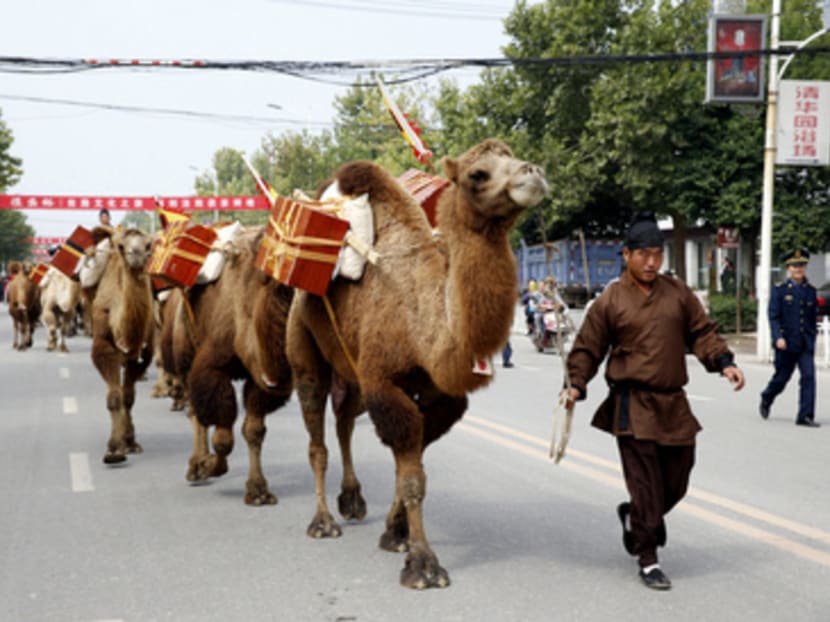Xi’s Silk Road revival plan faces obstacles
ALMATY (Kazakhstan) — President Xi Jinping’s grand plan to make China the centre of the world again by reviving the ancient Silk Road trading route faces obstacles at its first stop.

Mr Xi Jinping is staking political capital on the Silk Road, which started from Shaanxi province and represented the golden years of Chinese civilisation. PHOTO: REUTERS
ALMATY (Kazakhstan) — President Xi Jinping’s grand plan to make China the centre of the world again by reviving the ancient Silk Road trading route faces obstacles at its first stop.
In Kazakhstan, through which Mr Xi envisages pipelines, roads and railways revitalising an economic belt that stretches halfway around the world to Venice, China has struggled to gain a significant foothold.
It has failed in efforts to realise a free trade agreement mooted 22 years ago and, in 2009, the Kazakh President was forced to deny a plan to lease farmland to China after angry protests from a public wary of their neighbour’s growing power. What’s more, Mr Xi’s vision for a bloc that involves at least 60 countries has left government advisers from Almaty to Delhi largely in the dark about the details.
While Kazakhstan’s leaders have voiced support, enticed by billions of dollars in infrastructure funding, analysts in the country say the strategy involves greater Chinese influence that may be a harder sell to its people.
“Xi’s proposed idea is to form the foundation of a new geopolitical concept of China,” said Mr Konstantin Syroezhkin, an adviser to the Kazakh President. “All discussions before were mainly around the economic component of China’s relations with this region, but Xi has put forth a vision that is much broader.”
China’s leader is staking political capital on the Silk Road, which started from his home province of Shaanxi and represented the golden years of Chinese civilisation. During the Han Dynasty that ruled for four centuries from around 200BC and the Tang Dynasty from the seventh century, the route made China’s economic and trade prowess the envy of the world.
It is part of Mr Xi’s “Chinese dream” to rejuvenate the Middle Kingdom and expand its sphere of influence beyond economics to politics and culture at a time when the United States is seeking to reassert itself in the region. A second maritime Silk Road that traverses the Horn of Africa en route to Europe was later unveiled by Mr Xi in Jakarta.
Earlier this month, Mr Xi pledged US$40 billion (S$52 billion) to set up a Silk Road Fund that will finance the construction of infrastructure along the route, but China may need more than money to succeed in places such as Kazakhstan, a former Soviet state on China’s western border, which is happy to do business with its neighbour, but has not been so keen on building a close friendship.
“China is too powerful, too strong and we’re afraid of being overwhelmed,” said Ms Nargis Kassenova, director of the Central Asian Studies Centre at KIMEP University in Almaty. “It is hard to turn down what China can offer, but we resist the full embrace of Chinese power. We’re just trying to benefit economically.”
China surpassed Russia as Kazakhstan’s top trading partner in 2010 and trade with the five former Soviet republics in Central Asia has jumped more than 20 times to US$46 billion in 2012 from US$1.8 billion in 2000, showed data from China’s Ministry of Commerce. Lying on some of the world’s biggest oil and gas reserves, Kazakhstan signed cooperation contracts and agreements worth US$30 billion last year to help slake its neighbour’s thirst for energy.
When Mr Xi visited Kazakhstan in September last year, he outlined a much more comprehensive relationship and dangled the carrot of an unparalleled market of almost three billion people along the New Silk Road Economic Belt to Europe.
He urged all countries involved to support one another on issues concerning sovereignty, territorial integrity and security, while cracking down on the “evil forces” of terrorism, extremism and separatism.
“The Silk Road Economic Belt needs to be seen as a key part of the foreign policy legacy that Xi Jinping is building for himself,” said Mr Raffaello Pantucci, director of International Security Studies at the London-based Royal United Services Institute. “It has the effect of both helping the domestic situation in western China, but also growing China’s power and influence across the Eurasian landmass.” BLOOMBERG





